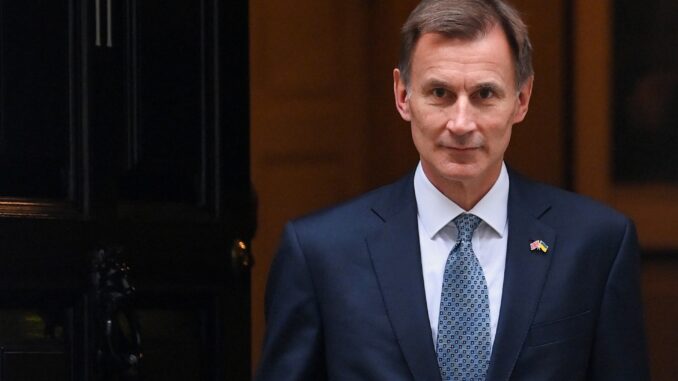
The United Kingdom’s Chancellor of the Exchequer Jeremy Hunt has unveiled an emergency budget, featuring tens of billions in spending cuts and tax increases as the country’s new government seeks to restore the economic credibility and patch up the nation’s battered finances.
Hunt on Thursday delivered the plan for tackling a sputtering economy in a speech to the House of Commons, saying it prioritised “stability, growth and public services”.
He said more than half of the needed 55 billion pounds ($65bn) fiscal consolidation would come from cuts in spending.
“On tax, I have tried to be fair by following two broad principles: firstly, we ask those with more to contribute more; and secondly, we avoid the tax rises that most damage growth,” Hunt said.
He reduced the threshold at which the 45 percent personal income tax rate becomes payable from 150,000 pounds (about $178,500) to 125,140 pounds (about $148,900).
Those earning 150,000 pounds (about $178,500) or more will pay just more than 1,200 pounds (about $1,400) more a year.
“I am maintaining at current levels the income tax personal allowance, higher rate threshold, main national insurance thresholds and the inheritance tax thresholds for a further two years taking us to April 2028,” he said.
“The dividend allowance will be cut from 2,000 pounds [about $2,400] to 1,000 pounds [about $1,200] next year and then to 500 pounds [about $600] from April 2024. The annual exempt amount for capital gains tax will be cut from 12,300 pounds [about $14,600] to 6,000 pounds [about $7,300] next year and then to 3,000 pounds [about $3,650] from April 2024.”
Hunt also said his government would increase a windfall tax on oil and gas firms and extend it to power generation firms.
The levy will be increased to 35 percent from its current rate of 25 percent. It will also apply to electricity generators with a levy of 45 percent being applied from January 1.
Public spending
Hunt said the country’s health and social care system would receive an 8 billion pounds ($9.5bn) package within two years, which he said health chiefs had indicated would help fulfil key priorities.
He said he would increase the state-run National Health Service budget in each of the next two years by an extra 3.3 billion pounds ($3.9bn).
“The chief executive of the NHS, Amanda Pritchard, has said this should provide sufficient funding for the NHS to fulfil its key priorities,” Hunt said.
He said there would be an increase in funding available to the social care sector of up to 2.8 billion pounds ($3.3bn) next year and 4.7 billion pounds ($5.6bn) the year after.
He also said: “I can announce today that next year and the year after, we will invest an extra 2.3 billion pounds [$2.7bn] per year in our schools.”
End of Trussonomics
The British stock market slid 0.6 percent and the pound fell versus the US dollar before Hunt’s announcement.
Traders feared the budget would worsen the UK’s cost-of-living crisis after inflation spiked to a 1981 peak of 11.1 percent in October, as the economy headed towards a recession.
The emergency budget statement aimed to restore the government’s financial and political credibility after former Prime Minister Liz Truss announced 45 billion pounds ($53bn) in unfunded tax cuts that torpedoed investor confidence, sent the pound to record lows against the US dollar and sparked emergency central bank intervention.
Truss was forced to resign six weeks after taking office.
The budget comes against a grim backdrop, with the war in Ukraine, aftershocks from the COVID-19 pandemic and the economic strains of Britain’s exit from the European Union all weighing on the UK economy.
Economic output shrank by 0.2 percent in the third quarter, and the Bank of England predicted a recession that could last as long as two years.
The government is also paying the price for the unfunded tax cuts announced by Truss, which damaged the UK’s reputation for financial discipline and boosted government borrowing costs.
Hunt and Prime Minister Rishi Sunak, who replaced Truss as Conservative Party leader and prime minister last month, have reversed most of Truss’s policies while pledging that the government will pay its bills and start reducing debts built up over the past 15 years.
UK public debt ballooned to nearly 83 percent of economic output in 2017 from less than 36 percent in 2007 as the government bailed out banks and struggled to bolster the economy.
A decade of budget tightening had started to reduce the burden when the COVID-19 pandemic and war in Ukraine pushed debt to 98 percent of gross domestic product (GDP).
That is the highest since 1963, when Britain was still recovering from World War II.

